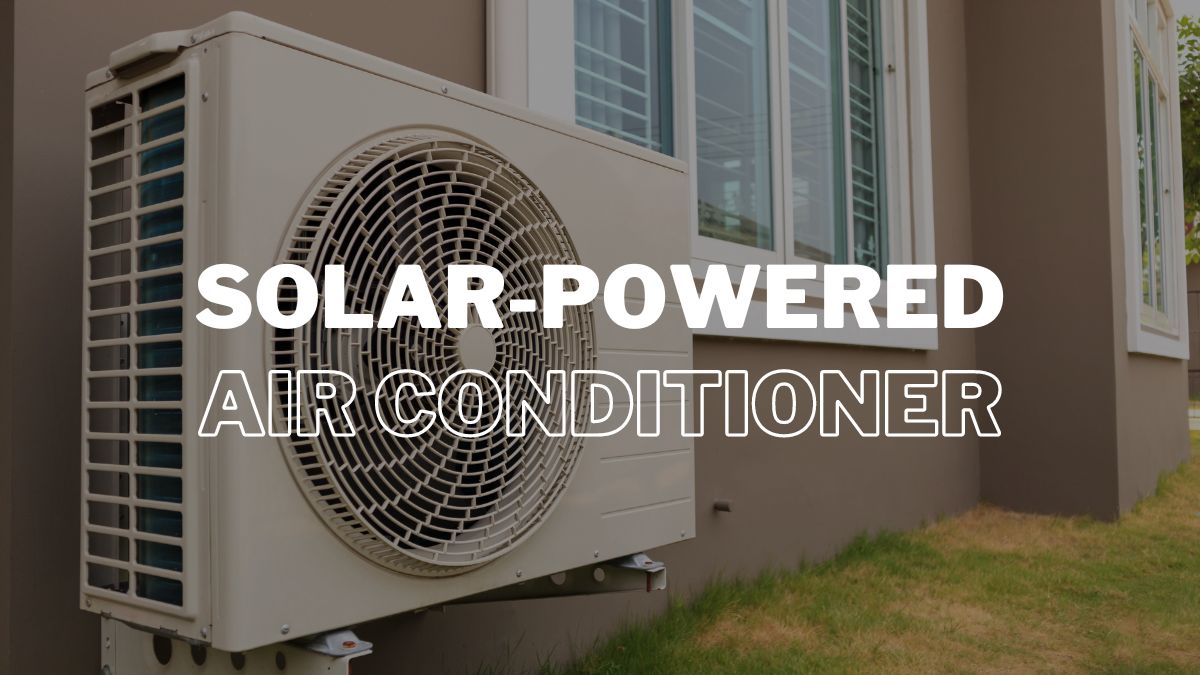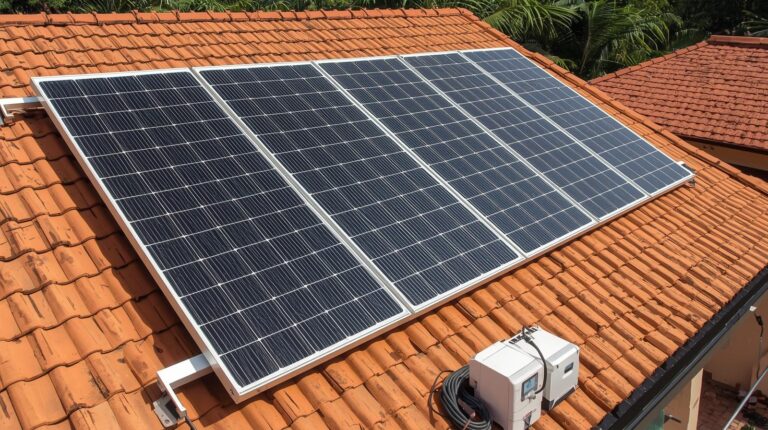Have you ever wondered how many solar panels it takes to power an air conditioner? Well, we have the answers you need. In this article, we will explain the technical aspects of AC energy consumption and provide case studies to help you better understand how many solar panels to run an air conditioner. We will also discuss the factors involved in running an AC unit with solar panels.
Using solar panels to power an air conditioner is a great way to save energy and help the environment. It’s a simple and efficient choice that can keep your home cool without relying solely on traditional power sources. Plus, it saves you money on utility bills in the long run. Switching to solar AC units is a smart step toward a more sustainable and energy-efficient lifestyle. So, if you want to join the solar power community, keep reading!

Understanding AC Energy Consumption
To understand AC energy consumption, we need to consider the factors that affect how much energy an air conditioner uses.
One important factor is the size and type of the AC unit. Different units have different wattage requirements, which affect their energy use. For example, a small window AC unit usually uses 500 to 1500 watts, while a central AC unit can use 2000 to 5000 watts or more.
Another important factor is the efficiency of the AC unit. Older models are less energy efficient than newer ones. Upgrading to a high-efficiency AC unit can help reduce energy use.
If you want to power your AC unit with solar energy, the number of solar panels you need depends on the AC unit’s wattage, energy use, and the amount of sunlight in your area.
How Many Solar Panels To Run An Air Conditioner? Case Studies
We looked at two examples to figure out how many solar panels are needed to power an air conditioner. In the first example, we studied a house in Los Angeles with a central AC system. We found that 15 solar panels were needed to run a 2-ton AC unit efficiently.
In the second example, we added a small AC unit to a house in Minnesota for the summer. We found that 5 additional solar panels were needed to run the window AC unit effectively. Here is the table that shows the results:
| Case Study | Location | AC Unit Type | Solar Panels Needed |
|---|---|---|---|
| Case Study 1 | Los Angeles | Central AC System | 15 |
| Case Study 2 | Minnesota | Window AC Unit | 5 |
These examples show that the number of solar panels needed depends on the location and type of AC unit. It’s important to consider these factors when deciding how many solar panels are needed to power an air conditioner effectively.
Considerations for Solar Panel Systems
When choosing solar panel systems to power your air conditioner, there are a few important things to consider. Here are some key points to keep in mind:
- Solar Panel Size: Make sure the solar panel system you choose can generate enough electricity for your air conditioner. It’s a good idea to consult with a professional to determine the right size and capacity for your needs.
- DC to AC Inverter: An inverter is needed to convert the solar panel’s DC power into the AC power your air conditioner requires. Choose an inverter that’s compatible with your solar panel system and meets your AC unit’s voltage and power needs.
- AC Module or Micro-Inverter: Consider investing in an AC module or micro-inverter system. This allows for individual panel-level optimization and monitoring, which can improve the overall efficiency and performance of your solar panel system.
- Energy Storage: Depending on where you live and your energy requirements, it could be beneficial to have an energy storage solution like batteries. This allows you to store excess energy generated during the day for use at night or when your air conditioner needs more power.
Considering these factors will help ensure that your solar panel system is the right size and equipped to efficiently power your air conditioner.
Running an AC Unit with Solar Panels
Using solar panels to power an air conditioner can be a cost-effective and eco-friendly option. When running an AC unit with solar panels, there are a few things to think about.
First, find out how much power your AC unit needs. You can usually find this information in the unit’s specifications or user manual. Once you know the power requirements, you can calculate how many solar panels you need. The size and efficiency of the panels also affect the total number needed.
Additionally, consider where and how your solar panels are positioned to get the most sunlight. Note that running an AC unit with solar panels may require a larger system to handle the extra energy demand.
However, the benefits of solar power, like lower electricity bills and reduced carbon emissions, make it a worthwhile investment.
Factors to Consider Before Running AC with Solar Power
One important thing to think about is how many hours of sunlight you get each day and how much power your solar panels can produce. This will affect how well your AC runs on solar power.
Here are four other things to consider before using solar power to run your AC:
- Location: The amount of sunlight you get depends on where you live. Places with more sunlight will make it easier to run your AC with solar power.
- Climate: The climate plays a big role in how much energy your AC needs. If you live in a hot climate, you’ll need more energy to cool your space, which means you’ll need bigger solar panels.
- AC Size: The size of your AC unit, measured in tons, determines how much power it uses. Bigger units need more energy, so you’ll need solar panels that can handle that.
- Power Usage: It’s important to know how much power your AC uses. This includes its efficiency rating and how much power it needs at its busiest times. Knowing this will help you figure out what size solar panels you need.
Calculating the Number of Solar Panels Required for AC
To figure out how many solar panels to run an air conditioner, we’ve to calculate the total power the AC uses. We can do this by multiplying the AC’s wattage by the number of hours it runs each day. Once we know this, we can use this formula:
Number of solar panels = Total AC power usage / Panel wattage
Let’s use an example to understand the calculation. Let’s say our air conditioner uses 1500 watts and runs for 8 hours a day. If our solar panels have a wattage of 250 watts each, the calculation would look like this:
AC Power Usage (W) = 1500
Panel Wattage (W) = 250
Number of Solar Panels = 1500 / 250 = 6
Based on this example, we’d need 6 solar panels to power our air conditioner. It’s important to remember that real-life factors like the weather and panel efficiency can affect the actual number of panels needed.
Factors to Consider for Solar System Design
When designing a solar system, we need to consider a few things. These include how much sunlight is available and how much energy the air conditioner needs. Here are four important things to think about:
- Sunlight availability: The amount of sunlight where you live affects how well your solar panels work. More sunlight means more electricity, which makes it easier to power your air conditioner.
- Energy requirements: The power rating and energy consumption of your air conditioner determine how many solar panels you need. If your air conditioner uses more power and runs for longer, you’ll need more panels to meet the demand.
- Solar panel efficiency: The efficiency of your solar panels is important for turning sunlight into electricity. Panels with higher efficiency make more power from the same amount of sunlight, so you won’t need as many panels.
- Orientation and tilt: The angle and direction of your solar panels can make a big difference in how well they work. If you position them correctly to face the sun and adjust the tilt, they’ll absorb more sunlight and perform better.
Considering these factors will help you design an efficient solar system to power your air conditioner.
Solar Panels and Energy Generation
Solar panels work by converting sunlight into usable energy. The panels have cells that absorb sunlight and create an electric current. This is called the photovoltaic effect. Here’s a simple table to show you how much energy different-sized panels can generate in a day:
| Solar Panel Size | Energy Generation Capacity |
|---|---|
| 1 kW | 4-5 kWh per day |
| 2 kW | 8-10 kWh per day |
| 3 kW | 12-15 kWh per day |
| 4 kW | 16-20 kWh per day |
| 5 kW | 20-25 kWh per day |
The bigger the panel, the more electricity it can generate. Remember that these numbers are approximate and can vary based on factors like location, weather, and panel efficiency.
Calculation of Solar Panels Required to Run an Air Conditioner
To calculate the number of solar panels needed to run an air conditioner, follow these simple steps:
- Find the cooling capacity of the air conditioner in tons. This information is usually in the unit’s specifications.
- Calculate the energy consumption of the air conditioner in kilowatts. Multiply the cooling capacity by the average power consumption per ton. The manufacturer usually provides this information.
- Determine how many hours per day the air conditioner will be running.
- Multiply the energy consumption by the daily operating hours to get the total energy requirement per day.
Once you have the total energy requirement per day, you can calculate the number of solar panels needed based on their wattage and efficiency. Remember, factors like location, weather conditions, and desired battery capacity for backup power can affect this calculation.
Related Post: Savings Made Simple: Calculate Appliance Wattage for Efficiency.
Understanding AC Power Calculations
To figure out how many solar panels to run an air conditioner, you need to understand AC power calculations. AC power calculations are different from DC power calculations because AC power involves alternating current. While DC power calculations are simple, AC power calculations consider things like power factor and voltage changes.
Let’s look at a table to help us understand these calculations:
| Load Type | Power (W) | Power Factor |
|---|---|---|
| Air Conditioner | 1500 | 0.9 |
| Other Appliances | 500 | 1.0 |
| Total | 2000 | – |
In the table, the air conditioner has a power rating of 1500W and a power factor of 0.9. Other appliances have a power rating of 500W and a power factor of 1.0. To find the total power required, we add up the power of each load. In this case, the total power required is 2000W.
Understanding these AC power calculations is important for sizing a solar panel system correctly to power an air conditioner. By considering the power requirements and power factor, we can determine how many solar panels are needed to meet the AC load demand.
Rating Systems and Costs of Air Conditioning Units
When thinking about rating systems and costs for air conditioning units, it’s important to understand what affects their efficiency and price. Here are four important things to consider:
- Tonnage vs. Watts: Tonnage shows cooling capacity, while watts show power consumption. Understanding how these ratings relate to each other is important when choosing the right AC unit for your needs.
- EER (Energy Efficiency Ratio): EER measures cooling output divided by power input. A higher EER rating means a more energy-efficient unit, which can lead to lower operating costs over time.
- SEER (Seasonal Energy Efficiency Ratio): SEER is like EER but considers the unit’s performance over a whole cooling season. It gives a better idea of the unit’s energy efficiency in different conditions.
- Factors Affecting Cost: The cost per hour to run an AC unit depends on things like electricity rates, unit efficiency, insulation, and climate. Considering these factors can help estimate the long-term operating costs of different AC units.
Knowing these rating systems and cost factors can help you make an informed decision when choosing an air conditioning unit that fits your needs and budget.
Why Switch to a Solar AC Unit or Solar HVAC Unit
But why should we switch to a solar AC unit or solar HVAC unit? The answer is simple. These systems offer many benefits. Solar-powered AC units help reduce our carbon footprint. Regular AC systems release a lot of carbon dioxide, which causes climate change. By using solar energy, we can greatly reduce these harmful emissions and protect our environment.
Solar AC units also help us save on energy costs. Traditional AC systems use a lot of electricity, which leads to high utility bills. By switching to solar, we can use a renewable and free source of energy, which means we save money in the long run.
Solar AC units also give us energy independence. We can generate our own electricity and rely less on the power grid. This means we can be more self-sufficient and not worry as much about power outages.
Types of Solar-Powered AC Units
We have three main types of solar-powered AC units: DC solar air conditioners, AC solar air conditioners, and hybrid solar air conditioners.
- DC Solar Air Conditioners: These units are powered completely by solar panels. They use efficient DC motors and compressors, which make them great for places without access to the grid or during power outages.
- AC Solar Air Conditioners: These units are designed to work with both solar power and grid electricity. They can switch seamlessly between the two sources, giving you flexibility. AC solar air conditioners are ideal for areas with reliable grid access but still want to use solar energy during the day.
- Hybrid Solar Air Conditioners: These units combine solar power and grid electricity. They can run on solar power when it’s available and switch to grid power when needed. Hybrid solar air conditioners help reduce energy consumption and lower electricity bills.
Each type of solar-powered AC unit has its advantages and is suitable for different situations. Consider your specific needs and the availability of solar energy when choosing the right unit for your home or business.
Related Post: Solar-Powered AC: Cool Down and Save with Renewable Energy.
Frequently Asked Questions
How Much Does It Cost to Install a Solar Panel System to Run an Air Conditioner?
Installing solar panels to power an air conditioner can vary in cost depending on the size of the system and where you live. It’s important to talk to a professional to find out how much it will cost for you.
Are There Any Government Incentives or Tax Credits Available for Installing a Solar Panel System for an AC Unit?
There are government incentives and tax credits available for installing a solar panel system for an AC unit. It’s important to research and check with local authorities to understand what incentives are applicable in your area.
Can I Use My Existing AC Unit With a Solar Panel System, or Do I Need to Purchase a Specific Solar-Powered AC Unit?
We can use our current AC unit with a solar panel system. No need to buy a special solar-powered AC unit. This option saves energy and reduces reliance on the grid, which is good for the environment.
How Long Does It Typically Take for a Solar Panel System to Pay for Itself in Energy Savings?
On average, it takes around 5-7 years for a solar panel system to pay for itself in energy savings. For example, in a recent study, homeowners saw a return on investment after 6 years of using solar panels.
Are There Any Maintenance or Upkeep Requirements for a Solar Panel System That Powers an Air Conditioner?
There are some things you need to do to keep your solar panel system that powers an air conditioner working well. You should clean it regularly, check it, and fix any problems to make sure it works great and lasts a long time.
Summary
Using solar panels to power an air conditioner is a great way to save energy and reduce carbon emissions. By using the sun’s energy, you can keep your home cool without relying only on traditional power sources. This eco-friendly choice not only helps the environment but also saves you money on your utility bills in the long run. Switching to solar AC units is a smart step toward a more sustainable and energy-efficient lifestyle.




